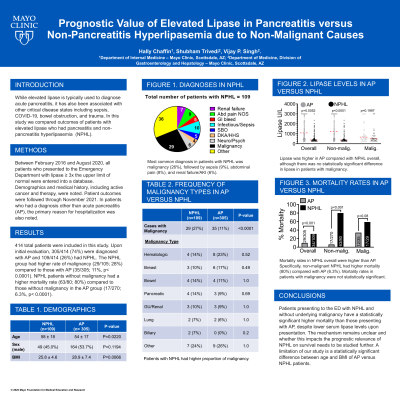Back


Poster Session B - Monday Morning
Category: Biliary/Pancreas
B0024 - Prognostic Value of Elevated Lipase in Pancreatitis versus Non Pancreatitis Hyperlipasemia (NPHL) due to Non-Malignant Causes
Monday, October 24, 2022
10:00 AM – 12:00 PM ET
Location: Crown Ballroom

Has Audio

Hally M. Chaffin, MD
Mayo Clinic Arizona
Scottsdale, AZ
Presenting Author(s)
Hally M. Chaffin, MD, Shubham Trivedi, BS, Vijay P. Singh, MBBS, MD
Mayo Clinic Arizona, Scottsdale, AZ
Introduction: While elevated lipase is typically used to diagnose acute pancreatitis, it has also been associated with other critical disease states including sepsis, COVID-19, bowel obstruction, and trauma. In this study we compared outcomes of patients with elevated lipase who had pancreatitis and NPHL.
Methods: Retrospective analysis was performed on all patients who presented to the Emergency Department between February 2016 and August 2020 with lipase ≥ 3x the upper limit of normal. Patient demographics and past medical history, including active cancer, were noted. Patient outcomes were followed through November 2021. If applicable, dates of death were also documented.
Results: 414 total patients were included in this study. Upon initial evaluation, 305/414 (74%) were diagnosed with acute pancreatitis (AP) and 109/414 had NPHL. The age (54 ±17 vs. 58 ±18, p=0.0220), Sex (male 164/305 vs. 49/109, p=0.1194), and BMI (28.9 ±7.4 vs. 25.8 ±4.6, p=0.0066) were compared between the AP and NPHL groups. The serum lipase in the AP and NPHL group were respectively 1471 ±1070 vs. 605 ±555 (p< 0.0001). The most common causes of NPHL were sepsis (10/109; 9%) renal failure (7/109; 6%), GI bleed (5/109; 4%), and bowel obstruction (5/109; 4%). The NPHL group had higher rate of malignancy (29/105; 28%) compared to those with AP (35/305; 11%, p< 0.0001). NPHL patients without malignancy had a higher mortality rate (63/80; 80%) compared to those without malignancy in the AP group (17/270; 6.3%, p< 0.0001). The most common malignancy in patients with AP was breast (6/35; 17%, vs. 3/29; 10%, p=0.4943). In NPHL, the most common malignancies were pancreatic (4/29; 14%, vs. 3/35; 9%, p=0.6920) and bowel malignancies (4/29; 14%, vs. 4/35, 11% p=1.0000).
Discussion: Patients with NPHL without malignancy have higher mortality than those with pancreatitis despite lower serum lipase levels. A limitation of our study is the difference between age and BMI of AP versus NPHL patients. Whether this impacts the prognostic relevance of NPHL on survival need to be explored in future studies.
Disclosures:
Hally M. Chaffin, MD, Shubham Trivedi, BS, Vijay P. Singh, MBBS, MD. B0024 - Prognostic Value of Elevated Lipase in Pancreatitis versus Non Pancreatitis Hyperlipasemia (NPHL) due to Non-Malignant Causes, ACG 2022 Annual Scientific Meeting Abstracts. Charlotte, NC: American College of Gastroenterology.
Mayo Clinic Arizona, Scottsdale, AZ
Introduction: While elevated lipase is typically used to diagnose acute pancreatitis, it has also been associated with other critical disease states including sepsis, COVID-19, bowel obstruction, and trauma. In this study we compared outcomes of patients with elevated lipase who had pancreatitis and NPHL.
Methods: Retrospective analysis was performed on all patients who presented to the Emergency Department between February 2016 and August 2020 with lipase ≥ 3x the upper limit of normal. Patient demographics and past medical history, including active cancer, were noted. Patient outcomes were followed through November 2021. If applicable, dates of death were also documented.
Results: 414 total patients were included in this study. Upon initial evaluation, 305/414 (74%) were diagnosed with acute pancreatitis (AP) and 109/414 had NPHL. The age (54 ±17 vs. 58 ±18, p=0.0220), Sex (male 164/305 vs. 49/109, p=0.1194), and BMI (28.9 ±7.4 vs. 25.8 ±4.6, p=0.0066) were compared between the AP and NPHL groups. The serum lipase in the AP and NPHL group were respectively 1471 ±1070 vs. 605 ±555 (p< 0.0001). The most common causes of NPHL were sepsis (10/109; 9%) renal failure (7/109; 6%), GI bleed (5/109; 4%), and bowel obstruction (5/109; 4%). The NPHL group had higher rate of malignancy (29/105; 28%) compared to those with AP (35/305; 11%, p< 0.0001). NPHL patients without malignancy had a higher mortality rate (63/80; 80%) compared to those without malignancy in the AP group (17/270; 6.3%, p< 0.0001). The most common malignancy in patients with AP was breast (6/35; 17%, vs. 3/29; 10%, p=0.4943). In NPHL, the most common malignancies were pancreatic (4/29; 14%, vs. 3/35; 9%, p=0.6920) and bowel malignancies (4/29; 14%, vs. 4/35, 11% p=1.0000).
Discussion: Patients with NPHL without malignancy have higher mortality than those with pancreatitis despite lower serum lipase levels. A limitation of our study is the difference between age and BMI of AP versus NPHL patients. Whether this impacts the prognostic relevance of NPHL on survival need to be explored in future studies.
Disclosures:
Hally Chaffin indicated no relevant financial relationships.
Shubham Trivedi indicated no relevant financial relationships.
Vijay Singh indicated no relevant financial relationships.
Hally M. Chaffin, MD, Shubham Trivedi, BS, Vijay P. Singh, MBBS, MD. B0024 - Prognostic Value of Elevated Lipase in Pancreatitis versus Non Pancreatitis Hyperlipasemia (NPHL) due to Non-Malignant Causes, ACG 2022 Annual Scientific Meeting Abstracts. Charlotte, NC: American College of Gastroenterology.

